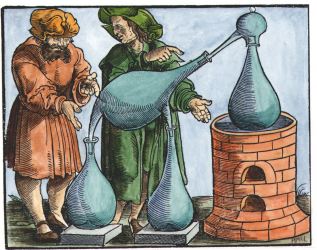As far as I read of her works, Hildegarde (1098-1179) sounds like someone who will trust more the knowledge deriving from revelation than the one coming from observation. In her Scivias Domini, she stigmatize the ‘vain Philosophy’ as a baleful act of pride, comparing it with the one of ‘the Fallen One’:
"La vaine Philosophie cherchant à découvrir les secrets de la nature, ne fait pas éviter la damnation, au contraire elle y précipite." (in : Les révélations de sainte Hildegarde, ou Scivias Domini : manifesté par le rapprochement de ses visions combinées entre elles [Paris, 1863]; Appendice sur la Grâce et la Philosophie, section 9°, pp.219-221).
Which seems a far cry from the views of her comtemporary, Guillaume de Conches (1080-1150):
"More rationnaly inclined, Willian of Conches regarded the liberal arts as steps that lead man towards an understanding of God. He explained the proper sequence of these studies.(...) Instruction in the Trivium provides the weapons for the study of philosophy. This study should be persued in that order : at first the Quadrivium and after that, the Holy scriptures. Thus knowledge of the created leads to an understanding of the Creator." (A. Katzenellenbogen, Sculptural programs of Chartres Catedral, Ed. Norton, 1959, p.18.)
Last edited on Thu May 14th, 2009 07:58 pm by Carl Lavoie
|

